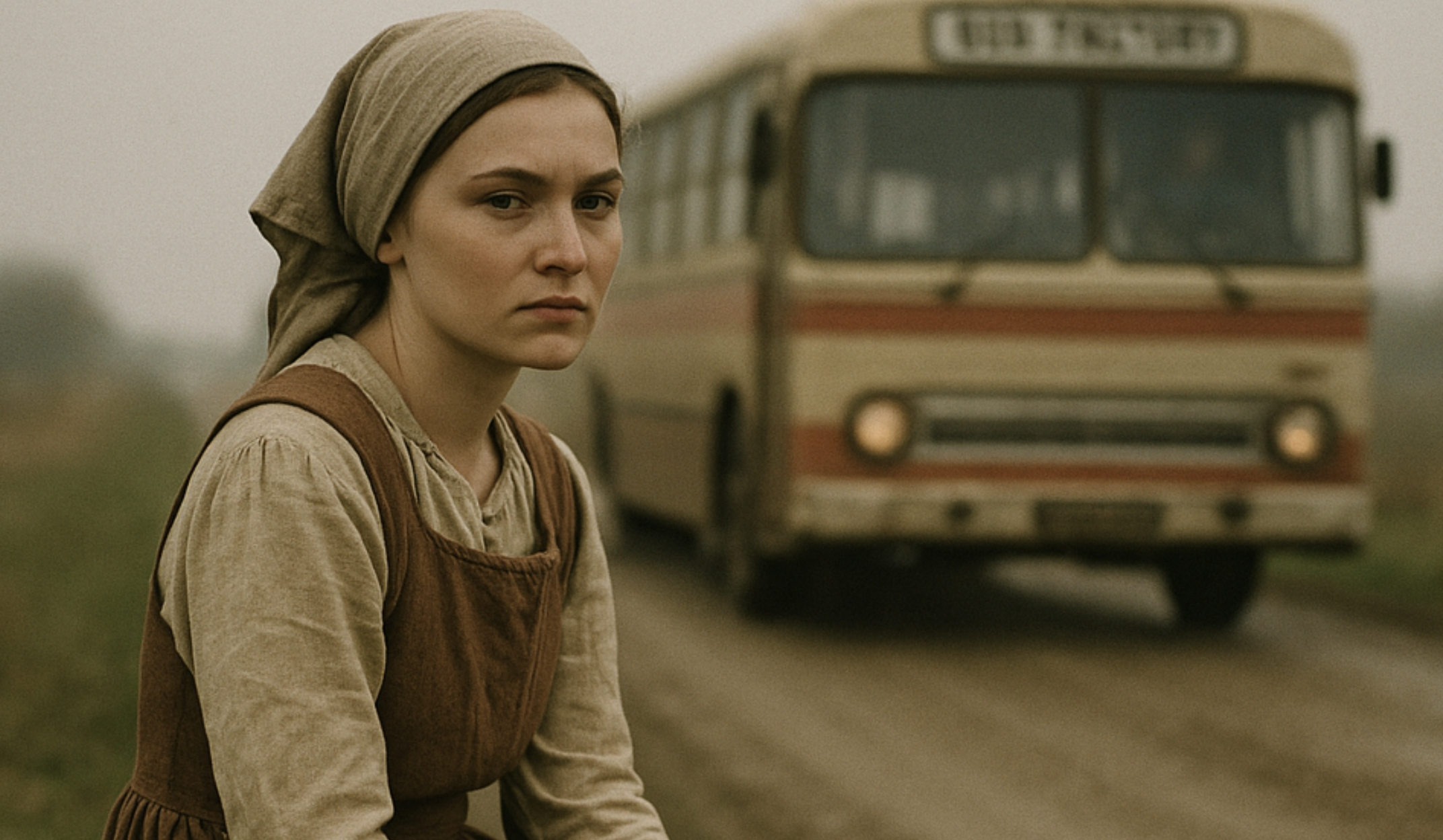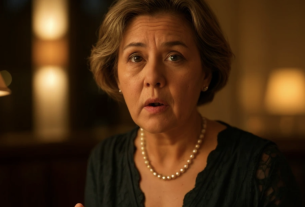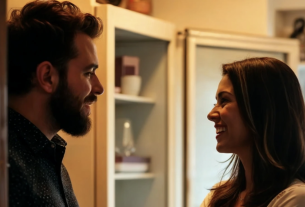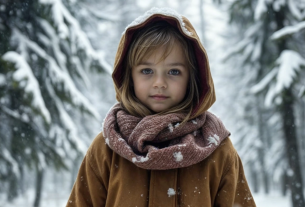Monday at the spacious, sunlit offices of the agribusiness buzzed like a disturbed beehive. A wrap-up meeting was underway in the hall, but most people were already thinking about their own tasks. Suddenly the director—a sturdy man of about fifty named Vitaly Semyonovich, always impeccably dressed in a neat checkered shirt—raised his hand, calling for silence.
His gaze swept over the rows and stopped on Maria Arkadyevna. She sat with her eyes down, a little off to the side, as if trying to blend into the wall. She didn’t like attention, especially this kind.
“Maria Arkadyevna, would you come up here, please,” he said, his voice unexpectedly gentle.
Masha, a petite woman with kind but tired eyes, stood up slowly. A barely audible rustle of whispers ran through the hall. Approaching the presidium table, she nervously fiddled with the edge of her work cardigan. The director smiled and held out a thick glossy envelope.
“This is for you, Maria Arkadyevna,” he said loudly enough for everyone to hear. Then he lowered his voice and added, “You’ve earned it. Let there be a little magic in your life.”
Her hands trembled as she took the envelope. When she opened it slightly, Masha couldn’t hold back an exclamation. Inside wasn’t a cash bonus, as she had expected, but a bright travel voucher shimmering with all the colors of the rainbow—an elite southern resort hotel. The picture of the sea and white sand looked like something from another, unreachable world.
“Vitaly Semyonovich… I… I can’t…” she stammered, looking at him in confusion.
“You can, and you must!” he answered firmly, now addressing all the staff. “This year, Maria Arkadyevna has done more for us than many do in an entire career. She turned the farm upside down—and only for the better!”
An approving murmur rolled through the hall, mixed with good-natured teasing.
“Look at that—‘Love and Pigeons,’ the new edition!” someone from accounting snorted.
And Yakov Petrovich, the local tractor driver and Masha’s most persistent admirer, shouted enthusiastically:
“Ah, expect a suitor on a white horse, Mashka! Here’s to our Maria Arkadyevna!”
Someone nearby instantly ribbed him:
“Let’s just hope the horse doesn’t throw a shoe at night like after the last office party!”
The hall burst into laughter again. Masha blushed to the roots of her hair, but laughed along with everyone. This noise, these rough jokes had long since become dear to her—a sign that she was accepted here.
She looked gratefully at her boss.
“And that’s not all,” he winked. “After the meeting, stop by accounting. You’ve got a nice cash bonus coming. For outfits!”
Masha slowly returned to her seat, clutching the cherished envelope in her hands. She stared at the picture of the sea and couldn’t believe it was real. One thought kept circling, almost forgotten, almost impossible: “God, could a miracle really happen to me?”
That evening, when the workday ended, Masha sat on the steps of the little house the company had provided her. A light breeze carried the smell of freshly cut grass and warm milk. So much had changed over the past year. And not long ago it had seemed life had nothing left to give.
Ten years earlier it had been different. She was a philology graduate, full of hopes and dreams of a big city career. Noisy streets, university lectures, friends, books, sleepless nights. And then Pavel appeared—an attractive, intelligent engineer with whom she thought she had found happiness.
But over time the romance faded. At first came gentle hints: “Why do you need a job? I’ll provide for us.” Then demands, then tantrums. Once he hit her—over some nonsense, oversalted soup. She cried, he asked for forgiveness, and she forgave him. Thus began a terrible vicious circle.
It all ended on a cold winter night. After another quarrel, Masha ran outside in just a robe and slippers. She saw nothing around her—only snow, pain, and fear. Only at the hospital, coming to her senses, did she find a kind woman at her side—Galina Andreyevna, the widow of a deceased veteran. It was she who suggested Masha leave for Novoandreevka.
That was the start of her new life. Masha worked on the farm, learned, made mistakes, but didn’t give up. Over time she became part of the village team. They accepted her, loved her. Even Yashka with his ribald ditties became one of her own.
The hardest time was that winter when a blizzard knocked out the power and the calf barn grew too cold. Masha made a decision on which the whole operation depended: save the animals at any cost. She opened her home to the newborn calves and spent the night among straw, milk, and the warmth of human hands.
It was after that incident that Vitaly Semyonovich decided a simple bonus wasn’t enough—Masha deserved a real miracle.
Packing for vacation felt like a fairy tale. She twirled in front of the mirror, trying on new clothes she’d bought with the bonus. Could this really be her—a smiling, lively woman with a sparkle in her eyes?
Her friends advised taking a taxi to the city, but Masha, used to saving, refused.
“It’s fine, the bus will get me there. Cheaper, and what I’m used to.”
But midway the bus suddenly stalled in the middle of the forest. Cell service disappeared. Masha stepped onto the road with her suitcase in hand, feeling the familiar panic rising inside. “It’ll all fall through. Again,” she thought, holding back tears.
At that moment a strange convoy appeared around the bend—two black cars with a shiny SUV between them. It stopped beside her. A tall man in a cashmere coat got out. His voice was soft but assured:
“Has something happened? Why are you crying?”
Masha looked at him in surprise. She didn’t yet know this encounter would be the beginning of something new.
Dabbing her tears with a handkerchief, Masha haltingly told him about the broken-down bus and the trip that was falling apart. The man, who introduced himself as Alexander Viktorovich, listened attentively and then said, quite unexpectedly:
“I’m flying south on business—on a private plane. If you’re not afraid, I can give you a lift.”
Maria froze. A private plane? It sounded like something from a film. She mumbled, flustered:
“I… I don’t even know how to thank you…”
“Get in,” he smiled, opening the car door.
An hour later she was sitting in a soft chair in a cozy cabin, looking out the porthole at the white clouds below. Was this really happening? Could a real miracle truly happen to her?
Alexander turned out to be surprisingly simple and good-natured. He ordered them coffee, and the conversation flowed easily, without awkward pauses.
“Forgive me if this is too personal,” he said, looking at her intently. “But I’m curious: you’re a smart, educated woman. Why do you work as a milkmaid?”
And Masha, not even knowing why, began to talk. About the philology department, about her dreams of a big career, about Pavel, about how she lost herself. She spoke cautiously, without delving into the worst details, but making it clear she had been through hell.
Alexander listened closely without interrupting. There was no pity in his eyes—only sincere compassion.
Then he spoke about himself:
“You know, I even envy you. In Novoandreevka you live among real people. Around me it’s all masks, fake friends who want my money. Twenty years ago I lost my best friend. Or rather, I betrayed him. And I never found the courage to ask forgiveness. He disappeared, and I was left alone with that pain.”
He fell silent, looking out the window. Masha watched him and felt her heart tighten with sympathy. “I also had a true friend,” she thought of Galina Andreyevna. “And now I’m looking for my own place in life.”
“We absolutely have to meet up on vacation,” Alexander said as the plane began to descend. “And talk more.”
The first days at the resort felt like a dream. Masha, being cautious, slathered herself with sunscreen from head to toe but still got burned—red as a lobster. Alexander noticed, laughed, and despite her protests dragged her into the water, insisting that seawater was the best medicine.
In the evenings they sat at a table in a quiet beachfront restaurant. Candles glowed, music played, the sea murmured. Masha felt the years of tension and fear leaving her body. At last, she could relax.
“That’s why I avoid people,” Alexander suddenly confessed. “Because once, I betrayed the one who trusted me most.”
He told the story of a student party, a careless misstep after which a friendship was destroyed. Nothing terrible happened, but the fact remained—he let his friend down. The friend said nothing, just left, cutting all ties.
“Do you have a photo of him?” Masha asked softly.
Alexander nodded and took an old picture from his wallet. Two young guys grinned, arms slung around each other, in front of a university dorm. Masha studied the face of the second man and froze. Her heart skipped. He looked strikingly like a young Vitaly Semyonovich.
“Is his name Vitaly?” she asked, her voice trembling slightly.
Alexander raised his eyebrows in surprise:
“Yes… Vitaly. How do you know?”
“Vitaly Semyonovich,” she whispered. “He’s my director.”
Masha returned home transformed. When Alexander’s SUV pulled up at her house, Yashka was already waiting by the gate—with an accordion and determination in his eyes.
“Masha! Marry me!” he blurted out without preamble. “I’ll help patch the roof and put up a new fence!”
Maria laughed and touched his shoulder gently.
“Yashka, dear, thank you. But I think it’s time I choose my own road. Don’t be mad at me.”
Alexander stepped out of the car. Yashka looked him up and down with displeasure, muttered something about “city slickers,” and stalked off, squeezing mournful wheezes from the accordion.
Alexander was as nervous as a schoolboy before meeting Vitaly. Masha took his hand:
“It’ll be okay. He’s kind. He’ll forgive you.”
At home, Vitaly Semyonovich was already bustling around the table, brewing tea, going to the window every so often. He knew whom Masha was bringing. When Alexander walked in, both men froze, unable to take their eyes off each other. Behind them lay twenty years of pain, resentment, and separation.
Masha helped Alexander find the first words of apology. After that, words weren’t needed. Alexander stepped forward, and they embraced. At first awkwardly, as if testing the taste of the past, then tightly, for real. In that embrace were tears, forgiveness, and the joy of reunion. The wall that had stood between them for so many years crumbled without a trace.
A year passed.
A summer day flooded with sunshine. All of Novoandreevka gathered for the wedding. Masha, in a simple white dress, happy and radiant, stood beside Alexander, who looked at her as if she were a miracle. Among the guests was Vitaly Semyonovich, holding his newly regained friend close. And under a birch tree, Yashka pumped his accordion with gusto, and the whole village danced, celebrating the birth of a new family—unusual, big, and unbelievably kind.



